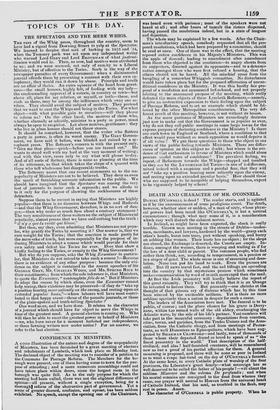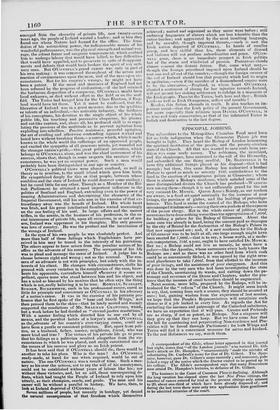DEATH AND CHARACTER OF MR. O'CONNELL.
DANIEL O'CONNELL is dead ! The reader starts, and is agitated as if by the announcement of some prodigious event. The death,
however, whether slow or sudden, of a man of sixty, whose physi- cal powers had been taxed like O'CONNELL'S, is but a natural circumstance; though what may come of it, is a consideration which may well disturb the calmest nerves.
In Ireland, as might have been expected, the shock is really
terrible. Grown men meeting in the streets of Dublin—trades- men, merchants, and lawyers, hardened by the world—grasp each other's hands, burst into tears, part without speaking, and hurry on sobbing like women. Their haste has no object; for the shops are closed, the Exchange is deserted, the Courts are empty. In-
doors, amongst the women, there is weeping and wailing as if for the loss of a dear child or parent. The common people, who feel rather than think, are, according to temperament, in a passion or
in a stupor of grief. The whole scene is one of mourning and deso- lation. None can put his hand to work. Even the presses are still. But ill news travel fast, and the sad tidings are spreading into the country by that mysterious process which sometimes makes communication by word of mouth more rapid than the mail. At first the Irish peasantry will hardly believe the report of this great calamity. They will try to think that it is an Orange
lie invented to harass them. But presently—one shrinks at the thought of that piteous cry of distress which has by this time been uttered by the exciteable millions. Yet is there no more sublime spectacle than a nation in despair for such a cause. The leaders of the Association have met. The funeral is to be public, of course; and the place chosen for his grave is Derry-
nane, within the ruined walls of the old abbey, overhanging the Atlantic wave, by the side of his life's partner. Vast numbers will take part in the mournful ceremony : deputations from counties,
cities, towns, and parishes, from the Trades Unions and the Asso-
ciation, from the Catholic clergy, and from meetings of Protes- tants, as well Dissenters as Episcopalians, which have been sug-
gested by SHARMAN CRAWFORD—and lastly, tens of thousands of those whom their departed friend so loved to speak of as " the finest peasantry in the world." That description of the half-
civilized, and alas ! half•fatnished creatures, will be remembered.
now as but a proof of his partial affection for them. A general mourning is proposed, and there will be none so poor in Ireland as to want a crape hat-band on the day of O'CONNELL'S funeral. At the same hour, in every Catholic place of worship of the four provinces, the Liberator's great family—what sovereign has so well deserved to be called the father of his people ?—will chant the sublime Miserere and the solemn De profandis ; and when his mortal remains are consigned to the dust from whence they came, one prayer will ascend to Heaven from the universal bead of Catholic Ireland, that his soul, so troubled in the flesh, may rest in peace. Amen.
The character of O'CoriNsu. is public property. When he emerged feirn the obscurity of private life, now twenty-seven years ago, the people of Ireland wanted a leader ; and in him they found one whom Nature hail formed for the office. The foun- dation of his astonishing power. the indispensable means of his wonderful performances, was the physical strength and animal cou- rage, the robust frame and sanguine temperament. which enabled him to undergo labour that would have killed, to face difficulties that would have appalled, and to persevere in spite of disappoint- ments and defeats that would have broken the spirit of any ordi- nary man. But O'Coweitss's grand career was only in part of his own making: it was composed throughout of the action and reaction of circumstances upon the man, and of the man 'Ten cir- cumstances. But for his country's wrongs, he might nut have been a patriot. If the mind and manners of England had not been softened by the progress of civilization,—if she hall retained the barbarous disposition of a conqueror, O'CONNELL might have lived unknown, or died without effect in the field or on the scaf- fold. The Tories had hanged him for the Clare Election, if Eng- land would have let them. Yet it must be confessed, that the liberation of Ireland was in a great measure due to the qualities or talents of an individual,—his untirable industry, the boldness of his conceptions, his devotion to the single object of his whole public life, his touching and persuasive eloquence, his pliancy and cat-like caution, and, above all, his profound skill in so regu- lating the passions of the multitude as to prevent agitation from exploding into rebellion. Passive resistance, peaceful agitation, the art of evading and otherwise contending against wicked and hated laws without breaking them,—a course which, while itsnade known to the whole world the sufferings of an oppressed people, and excited the sympathy of all generous minds, yet wounded not the stronger nation's pride,—this great political invention, which belongs to O'CoNalges alone, and was the chief instrument of his success, shows that, though in some respects the creature of cir- cumstances, he was yet an original power. Such a man would probably have been distinguished in any age or country. OVeresises's political views were almost confined, as well in theory as in practice, to the small island which gave him birth. He sympathized deeply for this or that people, between whose condition and the state of Ireland he could discover some analogy ; but he cared little for any other. Though as a Member of the Bri- tish Parliament he obtained a most important influence in the politics of Scotland and England, extending even to the power of naming Administrations and determining the character of the Imperial Government, still his sole aim in the exercise of that ex- traordinary sway was the benefit of Ireland. His whole heart was Irish, and his great intellectual faculties waited unceasingly on the one feeling of his soul. In large affairs and the merest trifles, in the senate, in the business of his profession, in the-so- cial intercourse of private life, upon all occasions, in or out of sea- son, Ireland was uppermost in his thoughts. His only passion was love of country. He was the product and the incarnation of the wrongs of Ireland. In the eyes of his own people he was absolutely perfect. And more than half of those failings which Englishmen have per- ceived in him may be traced to the intensity of his patriotism.
The others appear to have arisen from the peculiar nature of his office as the advocate of his country. The occupation of his life was to plead and manage the cause of Ireland. A judge has to choose between right and wrong ; not so the counsel. The con- cern of an advocate is not with principles, but solely with the in-
terests of his client. He changes with circumstances, shifts his ground with every variation in the complexion of the case, brow- beats his opponents, contradicts himself Whenever it seems ex- pedient, spares none who stand between him and his object, and has a mind so biassed by his motives that he often says the thing which is not, really believing it to be true. ROMILLY, SCARLETT, SUGDEN, BICRERSTETH, each in his professional career, cared as little for principle and consistency as O'CONNELL in his advocacy of a nation's cause. It was in the exercise of his patriotic pro- fession that he first spoke of the " base and bloody Whigs," and then praised them to the skies—that he lately moved and warmly supported the resolutions of Mr. SHARMAN CRAWFORD, which, but a week before he bad derided as " eternal-justice resolutions." With a master feeling which directed him to one end by all means, and the peculiar habits of a lawyer's mind, O'CONNELL, as the advocate of his country's ever-varying cause, could not have been a gentle or consistent politician. But, apart from poli- tics, as a husband, father, master, neighbour, friend, who was more kind and true ? The virtues of his private life go to prove that his failings as a politician resulted altogether from the cir- cumstances in which he was placed, and really constituted one of the means of his success and glory as an Irish patriot. It has been said that if O'CONNELL should die, there would be another to take his place. Who is the man ? An O'CONNELL ready-made, at hand for use when required, would be out of nature. The one O'CONNELL was a result of time. Such a mas- tery as his over the actions, not to say the will of his countrymen, could not be established without years of labour like his ; nor without those victories, and, let us add, those unconquering de- feats, which had taught the People of Ireland to rely upon him utterly, as their champion, oracle, and guide. The man and his career will be without a parallel in history. We have, then, to look at Ireland deprived of O'CONNELL. Seven millions of people, but recently in bondage, yet denied the natural consequences of that freedom which themselves achieved ; united and organized as they never were before; still enduring fragments of slavery which are less tolerable than the entire burden; and aggravated by the most insulting language, and by scornful, though impotent threats,—such is now the Irish nation deprived of O'CONNELL. In hands of smaller grasp, and less skilful than his, these elements of discord and violence will not produce subordination and peace. O'CON- NELL gone, there is no immediate prospect in Irish politics but of the storm and whirlwind of passion. Portentous clouds almost eunceal the distant future. But, come what may,— theugh the foreign priesthood imposed upon Ireland should be cast one and all out of the country,—though the foreign owners of the sail of Ireland should lose that property which had its origin in spoliation.—even if the sacrifice of a dismembered empire were to be the alternative,—England, in whose heart O'CONNELL planted a sentiment of shame for her injustice towards Ireland, will not permit her sinking arNtocracy to indulge in a massacre of the Irish people. Then let the Tories, both here and thee•, British Lords as well as Irish Orangemen, reflect and tremble I Reader, this fiction abounds in truth. It also teaches an im- portant moral—that the Irish policy of the present Government, but more especially their reliance upon DANIEL OCONNELL, is as wise and truly conservative, as that of the infatuated Tories is foolish and destructive to the last degree.



























 Previous page
Previous page